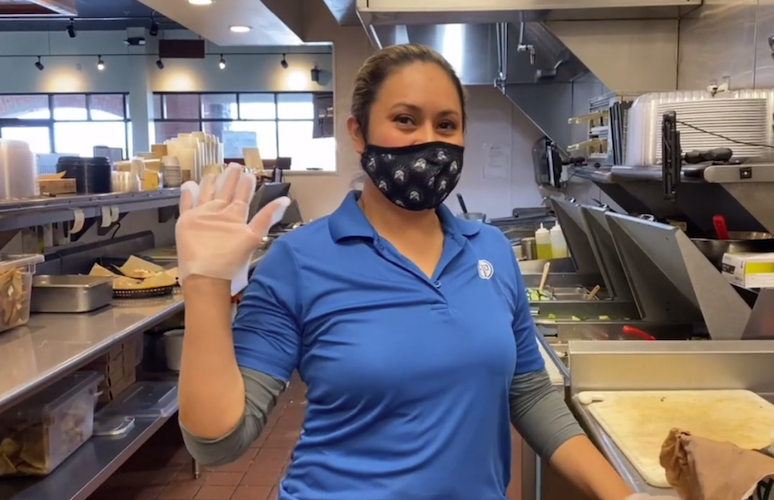Taziki’s Mediterranean Café is a family-style restaurant in both the food that it serves and the way it treats its employees and customers. The fast casual dining chain, headquartered in Birmingham, Alabama, opened its first location in 1998 after its founders experienced the joys of Mediterranean cooking while on vacation in Greece. Twenty-three years later, the franchise has 100 restaurants with plans to open 100 more in the next few years. That growth depends on having a committed and dedicated staff who are as invested in the restaurant’s success as its leaders are.
“Taziki’s is all about helping people flourish and finding tangible ways to invest in the communities that we serve,” says Dan Simpson, Taziki’s CEO. That includes hiring immigrants, refugees and people from underserved populations who often get overlooked by other employers. “They are the heart of our business,” he says.
Simpson notes that some of the company’s best and most loyal employees come from these communities, and he is excited to help them build a career with Taziki’s. “They demonstrate leadership skills and a desire to do more,” he says. However, one obstacle consistently stands in their way.
A barrier to success
Many of the people who work in Taziki’s kitchens do not speak English as their first language. They may have fundamental “kitchen English,” Simpson says, but it is not enough to work in the front of the restaurant or in management or supervisory roles. This obstacle was frustrating for Simpson, who wanted to find a way for these high-performers to move into more senior roles so they could build careers at Taziki’s and support their families.
So his team started looking at options. He initially considered classroom-based language courses at local community colleges, but feedback from employees was that these courses didn’t really help them. The courses often focus on basic English, and it took too long to reach a point where they could apply any new knowledge on the job.
“They needed training that was more specific, immediate and bite-sized to fit their lives,” Simpson says.
He started looking for online language training options and found EnGen (formerly Voxy EnGen), a language upskilling platform specifically built to empower language learners for “the jobs of the future.”
The hardest thing
“Most Americans don’t realize the challenges that English learners face when they come to this country,” says Katie Nielson, EnGen’s founder and chief education officer. “Learning a new language is one of the hardest things we ask adults to do.”
She regularly works with people who have advanced degrees from other countries who end up driving Ubers and working as janitors in the U.S. because they lack language skills. She’s also heard similar frustration with conventional English-as-a-second-language courses. “They don’t give them the skills they need to work and live.”
Nielson’s team created a more targeted learning solution that offers user-specific content and authentic conversations as a way to personalize the instruction to the needs of the learner. The program offers a combination of self-paced virtual lessons and live virtual classes customized to the kinds of conversations learners are likely to have on the job. “We make it relevant and as easy as possible,” she says.
Simpson’s team liked the format and the relevant content. “It was affordable, online, bite-sized, and it focused on technical speaking,” he says. “And the user experience was amazing.”
In 2020, his team launched a pilot program for a select group of learners to test the impact it could have.
Restaurant-specific content
Before beginning the training, users complete a survey to assess their current English language skills, their goals for the course and the kinds of content they like to read. The platform then generates lessons using specific terminology and workplace experiences — for example, conversations a server might have with a customer or that a manager might have with a prospective new hire. It ensures learners can start applying the lessons immediately in the workplace.
Nielson’s team worked with Taziki’s to identify common phrases that employees would use in the kitchen, with customers and with vendors, and then they transformed those into lessons. “It worked,” Simpson says. “Our employees showed immediate progress.”
Several employees from the initial pilot program can now confidently speak English and have been promoted since beginning the training, in part due to their new language skills.
Simpson points to Eduardo Martinez, a Taziki’s employee in Nashville, Tennessee, who started as an entry-level kitchen worker in 2016 and was recently promoted to manager after taking part in the EnGen training. “Voxy helped me grow my career,” Martinez says in an employee spotlight video featuring him. “I have more confidence in my English now, especially with my guests.”
Moments in life
Dayanna Vasquez (pictured above) has also seen a huge change since using EnGen. Vasquez started working at a Taziki’s in Virginia four years ago as a prep cook. Her manager noticed her commitment to the job and wanted her to take on more responsibility at the front of the restaurant. But her lack of English was holding her back. When Simpson launched the EnGen program, Vasquez’s manager recommended her for the training. “At first I said no, I’m fine,” she says (in perfect English).
Vasquez had tried learning English using a Rosetta Stone language program but had little success, and it shook her confidence. Eventually, however, she gave EnGen a try and made quick progress.
“It didn’t start with ABCs and numbers. Right from the beginning, they presented moments of real life,” she says. The lessons were built around words and phrases she could use right away, which inspired her to keep going.
Vasquez likes how the periodic tests show her how much she has learned, and how the platform increases the difficulty of the content as she advances. Her favorite part, however, is the live virtual classes where she gets to practice her new language skills with other learners. “At the beginning I didn’t want to say anything because I was afraid people would laugh,” she says. But she found the group work to be supportive and that the teachers were always encouraging and pointing out ways she can improve her pronunciation and context. “It’s a good way to learn.”
One year after starting the program, Vasquez was promoted from kitchen staff to systems manager, and she now oversees crews and works directly with customers and vendors. “I couldn’t imagine doing those things before, but now I am,” she says. “Learning English opened that door.”
We need to do more
Simpson is now planning to roll out the program across the Taziki’s franchise, and owners and their employees are eager to get started. “They are hearing the stories about how EnGen has helped employees improve their income and confidence,” Simpson says. “It is not a hard program to sell.”
He sees EnGen as one more tool to help Taziki’s deliver on its mission of supporting refugees, immigrants and other underserved communities. “We want them to become managers and owners, so they can change the financial future for their families,” he says. “Empowering them with language skills can help make that happen.”
It also helps the restaurant retain some of its best talent and create a culture that makes current and future employees want to stick around. “Restaurants need to do a better job of helping individuals find opportunities to flourish,” he says. While a lot of people treat these jobs as a stepping stone, with the right support it can be the beginning of a lifelong career.
“Staffing is the No. 1 problem in our industry,” he says. “Being able to retain people like Eduardo and Dayanna and help them overcome the language barriers will be important to our future success.”















